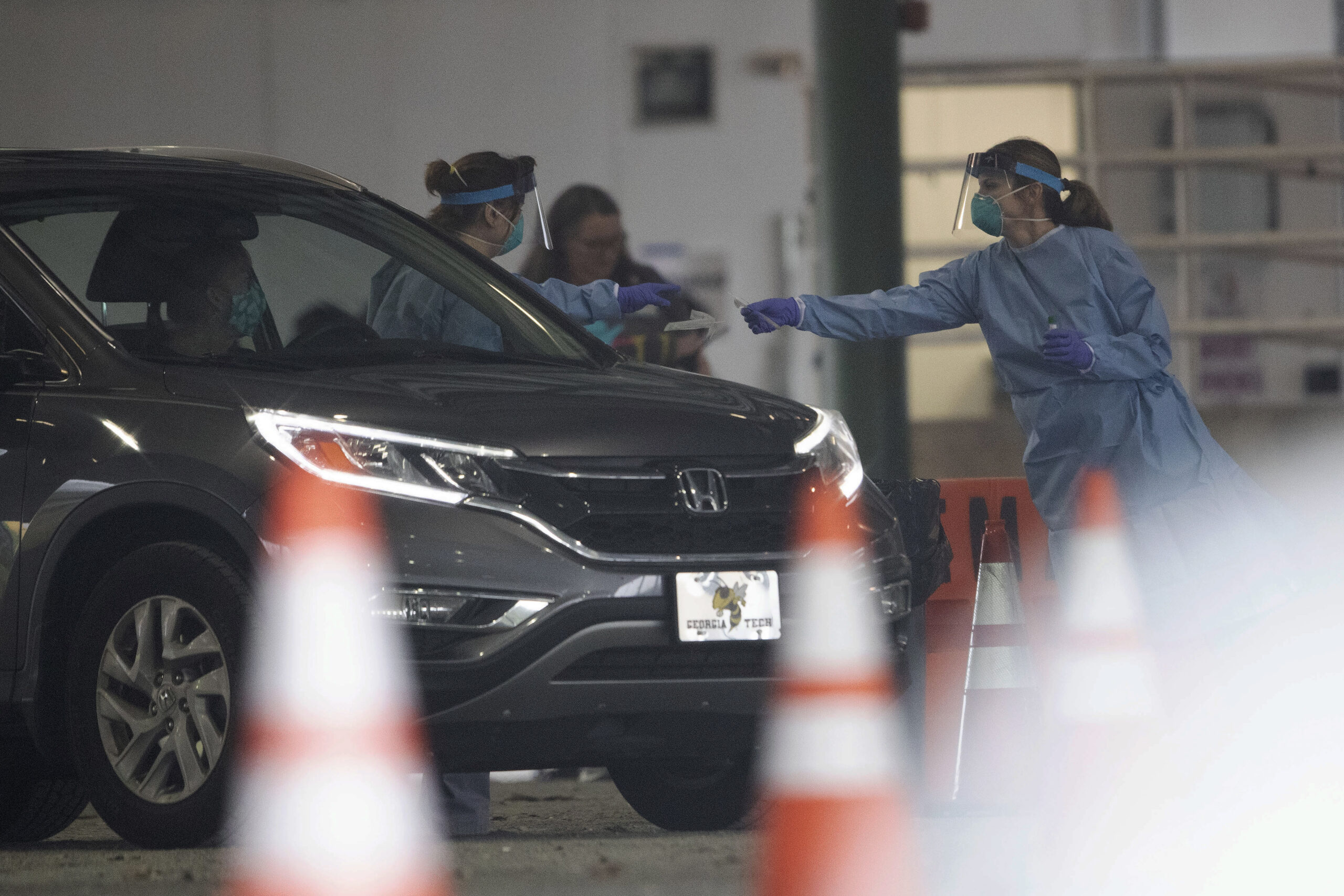Updated at 7:58 p.m. Thursday.
On Thursday evening, Gov. Brian Kemp signed the executive order he previously announced, which mandates a statewide shelter-in-place.
The order goes into effect Friday at 6 p.m. until April 13. It includes exceptions for activities such as buying food, household and medical supplies and exercising outdoors with 6 feet of distance. It requires all restaurants to switch to take-out and forces all businesses like hair salons, massage therapists, fitness centers and theatres to close.
This comes as coronavirus infections in Georgia climbed past 5,400, just a month after the state confirmed its first cases.
At least 176 deaths in Georgia have been linked to the new virus, the state Department of Public Health reported. And more than 1,000 have been hospitalized since Kemp announced March 2 that officials had confirmed Georgia’s first two coronavirus infections.
The escalating health crisis, and growing concerns that the virus is being spread by infected people who show no symptoms, prompted Kemp to prepare a shelter-at-home order for the entire state. The Republican’s governor planned to release details of his order Thursday, and it was to take effect Friday.
“When Georgians listen to the guidance provided and follow the orders issued they are actively joining the fight against this deadly disease,” Kemp told reporters as he announced the decision Wednesday.
In explaining his decision, Kemp cited concern that the virus is being spread by seemingly healthy people who are infected but have no symptoms such as fever or cough, saying “those individuals could have been infecting people before they ever felt bad.”
“We didn’t know that until the last 24 hours,” Kemp said at his news conference with Dr. Kathleen Toomey, commissioner of the Georgia Department of Public Health. “And as Dr. Toomey told me, she goes, ‘This is a game changer for us.’”
In fact, experts have been warning for at least two months that infected people can spread the coronavirus even if they have no symptoms.
However, it was on Wednesday that new research on asymptomatic transmission of the virus caused the federal government to change how it defines the risk of infection to Americans. The new guidance from the Centers for Disease Control and Prevention says anyone exposed to the disease can be a carrier.
Advocates Call For Statewide Stop To Utility Shutoffs
Gov. Brian Kemp is being asked to help stop utility shut-offs during the coronavirus crisis.
Community advocates in Georgia also want service returned to people who have already been cut off.
Sixty organizations in Georgia sent a letter to the governor, saying people need water, gas, and electricity right now–to be able to safely stay at home, wash their hands, and work or study online– regardless of whether or not they have been able to pay their bills.
Some utilities have already promised not to cut off service. But the groups says the governor should use his power to make sure the rest do the same.
This comes as the Georgia Department of Health reported more than 5,000 confirmed cases of coronavirus as of noon Thursday. There are more than 1,000 hospitalizations and 163 deaths.
Governor Closes Schools For Rest Of Year
Gov. Brian Kemp is ordering all Georgians to shelter In place beginning Friday and continuing through April 13 to help stop the spread of the coronavirus.
In a news conference Wednesday, Kemp also said that Georgia public schools will be closed for the remainder of the school year.
“I will sign an executive today closing K-though-12 public schools for the rest of the school year,” he said.
Since schools were dismissed last month, students have been learning via online lessons.
Georgia Senators Urge Quick Funds For Rural Hospitals
Georgia’s two U.S. Senators signed onto a bipartisan letter to the Trump administration, urging immediate payments to rural hospitals.
Many are struggling financially, because elective surgeries… that make up a large part to their revenue …. have been put on hold.
Jimmy Lewis with Hometown Health represents 55 rural hospitals in the state. He says many of them will be out of money by April 15, just as they’re getting ready for an expected wave of COVID-19 patients.
“We’re sitting ready. We know there’s a war that’s about to occur. We got all the soldiers lined up and we’re waiting for the opposition which is called a virus to come at us,” he said.” And in the meantime the cost of carrying a fighting warrior without revenue coming in is tremendous.”
Judge Allows Sterigenics Plant To Reopen
A federal judge is allowing a medical sterilization plant in Cobb County, Sterigenics, to temporarily resume full operations.
The judge granted the plant’s request for a restraining order against Cobb County to keep from being forced to shutter the facility.
The plant said in a statement that it can now serve the urgent needs of health care workers and patients by sterilizing medical equipment during the pandemic.
The plant has been closed since August after environmental activists and Cobb officials sounded alarms over the company’s use of ethylene oxide emissions – a carcinogenic gas.
In light of the coronavirus pandemic, Cobb officials allowed Sterigenics to temporarily reopen under an emergency order last week. That was urged by the FDA.
Sterigenics then filed a federal lawsuit against the County.
In the suit, Sterigenics claims it voluntarily enhanced its emissions control system, even though the plant had already passed federal emissions regulations.
Home Improvement Stores Busy
With Georgians hunkering down at home a lot of people are now taking time for home improvement projects and yard work, and that means hardware stores have been busy.
“People are shopping for flowers for their garden, mulch,” says Ron, who works at a major home improvement retailer. “Window shopping for patio doors, window blinds. Window shopping for flooring, carpet installs, tiles, and shelving for their garage and basements.”
He says he’s disappointed that people aren’t being more careful.
“I am quite frankly utterly flabbergasted, if not alarmed, at the amount of people that do not take other people’s health and lives under consideration,” he says. “A lot of lives are at risk.”
Lowe’s and The Home Depot have both announced that they are limiting hours to allow for more cleaning, giving some or all hourly employees more paid time off, and donating money or items to hospitals and health care workers.
Still, Ron says he wishes people would take this more seriously, too.
“New York, East Coast, West Coast, New Orleans, I hope we all make it out of this,” he says.
Engagement at WABE is powered, in part, by our collaboration with America Amplified, a Corporation for Public Broadcasting-funded initiative to use community engagement in our reporting.









